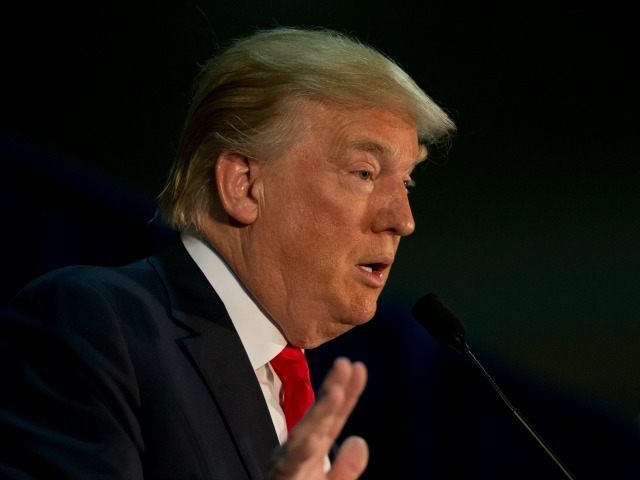The lasting positive benefit of Donald Trump’s dominance of the Republican nomination battle so far, perhaps, has been to draw many in the media out of their well-crafted veneers of objectivity.
For many political scribes living snuggly in the Acela Corridor, the voter anger that is fueling Donald Trump’s campaign a priori, must come from a very dark place.
This weekend, Politico turned its new magazine feature over to a college graduate student to argue that “authoritarianism” was the unique force behind Trump’s steady support in the polls.
The student, Matthew MacWilliams, who also has a political consulting firm, doesn’t merely assert that an authoritarian tendency makes one more likely to support Trump, he claims it is THE trait that determines support for the frontrunner.
MacWilliams, however, tips his hand very early in the piece. In the fifth paragraph he notes,
Authoritarianism is not a new, untested concept in the American electorate. Since the rise of Nazi Germany, it has been one of the most widely studied ideas in social science.
Emphasis unnecessarily added, because, obviously, everyone will get the point. Social science research on Nazi Germany apparently provides a lot of important context in understanding the rise of Trump.
MacWilliams violates “Godwin’s Law,” which states that the first person to cite the “Nazis” in a policy debate loses, before he even gets around to explaining his premise.
Setting aside this particular logical fallacy–MacWilliams, after all, is still a college student–his determination of what makes one an “authoritarian” is based on exactly 4 poll questions about child-rearing. As MacWilliams explains:
These questions pertain to child-rearing: whether it is more important for the voter to have a child who is respectful or independent; obedient or self-reliant; well-behaved or considerate; and well-mannered or curious. Respondents who pick the first option in each of these questions are strongly authoritarian.
Pay close attention to the choices presented there. Would you rather your child be “well-mannered” or “curious?” Perhaps in an academic’s world those are mutually exclusive traits, but in the real world of parenting they are each treasured traits.
One could argue that learning and displaying good manners is a sign of wanting to engage and interact with the world, a key factor in curiosity. That kind of debate, however, is better left in the student union.
MacWilliams rests some of his thinking on the work of political scientist Marc Hetherington, professor at Vanderbilt University. Just in case the reader was ambivalent about whether or not authoritarianism was bad, MacWilliams writes:
Hetherington has also found, based on 14 years of polling, that authoritarians have steadily moved from the Democratic to the Republican Party over time. He hypothesizes that the trend began decades ago, as Democrats embraced civil rights, gay rights, employment protections and other political positions valuing freedom and equality.
Remember, again, that, according to MacWilliams, one’s authoritarian tendency is based on four questions about child-rearing. He makes the fallacy here of extending a trait he might have identified in one area of life and extending it to specific policies. It borders on incoherence to argue that desiring a “well-mannered” child predisposes one against “civil rights.”
The disappointing thing here is that Hetherington has a more interesting hypothesis that perhaps goes much further in explaining the Trump phenomenon. In a paper published in 2014, Hetherington identies a decline in the public’s trust in government as a key determinant in battles over public policy.
[T]he recent polarization of political trust stands in the way of the emergence of public consensus on matters of public policy. The reason is simple; people who are distrustful of government are unwilling to make what we call “ideological sacrifices.” For a conservative to go along with a liberal policy idea like health care reform, for example, it requires her to sacrifice her general ideological principles that smaller government is better government. Those who trust government are much more apt to make such an ideological sacrifice. Those who distrust the government do not tend to do so.
Note, in this example, the conservative is hesitant to support health care reform, not because she is an authoritarian, but because she has a “general ideological principle that smaller government is better.”
Hetherington also notes that the “reservoir” to make significant changes to public policy has “run dry” because of a breakdown in trust of the federal government. This decline in trust of the government is especially pronounced in the Republican party. He writes:
The findings are remarkable. A stunning 52 percent of Republicans reported that they “never” trusted the government in Washington to do what is right. Another 46 said they trusted it “only some of the time.” A vanishingly small 2 percent reported trusting the government “most of the time” and not one Republican identifier said they trusted government “just about always.
Even a cursory review of headlines over the past year suggests there are an abundance of reasons for people to distrust the federal government. A recent Gallup survey found that more than 80 percent of both Democrats and Republicans said that “the way the federal government is working” was a top election issue for them.
When one looks at the state of the economy or the perceived standing of America in the world, it isn’t hard to understand the voter sentiment that is fueling not only Donald Trump, but also Bernie Sanders, Ted Cruz and Ben Carson. All four are campaigning against Washington as much as they are against their current political opponents.
In that sense, the Trump phenomenon is very easy to understand. It doesn’t require a detour into theories of child-rearing or, even, a trite and inane reference to Nazi Germany. Of course, Politico isn’t really trying to “understand” the Trump phenomenon. It is trying to smear it.

COMMENTS
Please let us know if you're having issues with commenting.